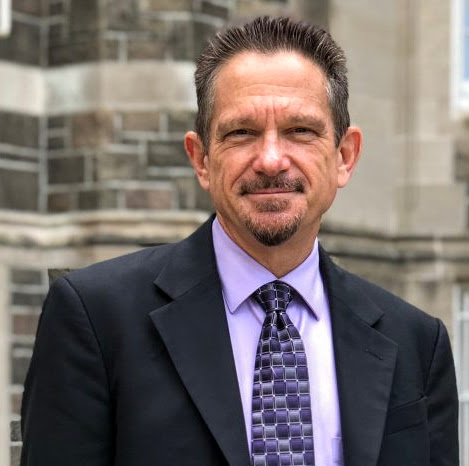Kirk A. Bingaman

Kirk Bingaman, Ph.D., is professor of mental health counseling and spiritual integration in the Graduate School of Religion and Religious Education at Fordham University. He is a licensed mental health counselor (LMHC) in the state of New York, a psychotherapist member with the Association for Clinical Pastoral Education (ACPE), and an ordained minister in the Presbyterian Church (USA). Dr. Bingaman is a former co-chair of the Psychology, Culture, and Religion (PCR) group of the American Academy of Religion (AAR), the former editor of the book series, Emerging Perspectives in Pastoral Theology and Care, (Lexington Books), and in 2021 was appointed editor-in-chief of Pastoral Psychology, one of the most well-established academic journals in the field of psychology and religion/spirituality. In 2018, he was a visiting scholar at Facolta' Teologica Del Triveneto in Padua, Italy, and in 2022 a visiting scholar at (1) the Higher Institute of Religious Sciences in Milan, Italy and (2) the Department of Philosophy, Sociology, Education, and Applied Psychology (FISPPA) at the University of Padua, Italy. Most recently, Dr. Bingaman was selected as a participant of the 2023 Faculty Research Abroad Program (FRAP) at Fordham University, working with faculty of the Ateneo De Manila University in the Philippines.
Dr. Bingaman is the author of several books, including Pastoral and Spiritual Care in a Digital Age (Lexington Books, 2020), The Power of Neuroplasticity for Pastoral and Spiritual Care (Lexington Books, 2016), Freud and Faith: Living in the Tension (SUNY Press, 2003) and Treating the New Anxiety: A Cognitive-Theological Approach (Jason Aronson, 2007). His current research focuses on the application of neuroscientific findings to the practice of pastoral/spiritual care and pastoral mental health counseling, which is the focus of his 2014 book, The Power of Neuroplasticity for Pastoral and Spiritual Care (Lexington Books). Dr. Bingaman’s 2018 book, Pastoral and Spiritual Care in a Digital Age: The Future Is Now (Lexington Books), explores the present and potential future impact of digital technology and artificial intelligence (AI) on human development and human spirituality, and the implications for pastoral/spiritual care providers, clinical practitioners, and religious faith communities. While on Faculty Fellowship in 2022, Dr. Bingaman published two peer-reviewed journal articles: (1) “The end of the world as we have known it? An introduction to Collapsology" (Pastoral Psychology Special Issue, December 2022), which explores the psychological and spiritual significance of the current climate emergency; and (2) “Religion in the digital age: An irreversible process” (Religions Special Issue, January 2023), which focuses on the irreversible nature of the digital revolution, and with it the increasing trend of religious disaffiliation, as well as the double-edged nature of social media.
-
B.A., Messiah UniversityM.Div., Princeton Theological SeminaryPh.D., Graduate Theological Union (Berkeley, CA)Licensed Mental Health Counselor (LHMC), New York
-
The application of neuroscientific research to pastoral/spiritual care, pastoral mental health counseling, and psychotherapy, in particular the finding that activity in the stress region of the brain can be lowered over time through regular contemplative-meditational practice. Additionally, a focus on the impact of digital technologies (including social media) and artificial intelligence (AI) on human development and human nature, and the implications for pastoral care and counseling.
-
Pastoral and Spiritual Care in a Digital Age: The Future Is Now, Lexington Books, 2018.
The Power of Neuroplasticity for Pastoral and Spiritual Care, Lexington Books, 2014.
Treating the New Anxiety: A Cognitive-Theological Approach, Jason Aronson, 2007.
Freud and Faith: Living in the Tension, State University of New York (SUNY) Press, 2003.
-
- Theology of Pastoral Counseling and Spiritual Care
- Theories of Pastoral Care & Counseling
- Human Growth and Development
- Social and Cultural Foundations of Pastoral Counseling
- Advanced Life Span Issues and Career Counseling
- Basic Skills of Pastoral Care & Counseling
- Ethics in Pastoral Ministry
Contact Information
441 East Fordham Road
Keating Hall 303
Bronx, NY 10458